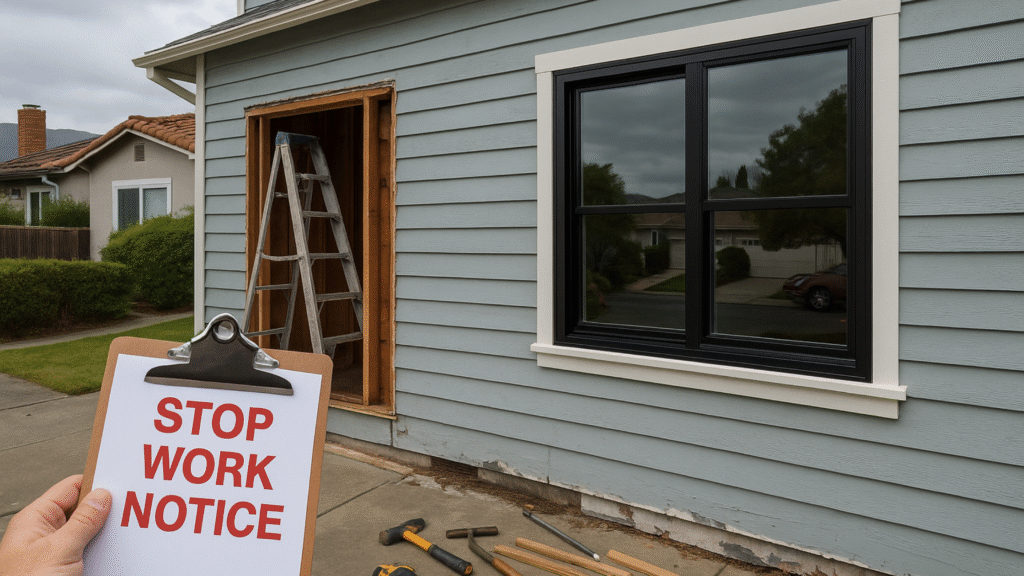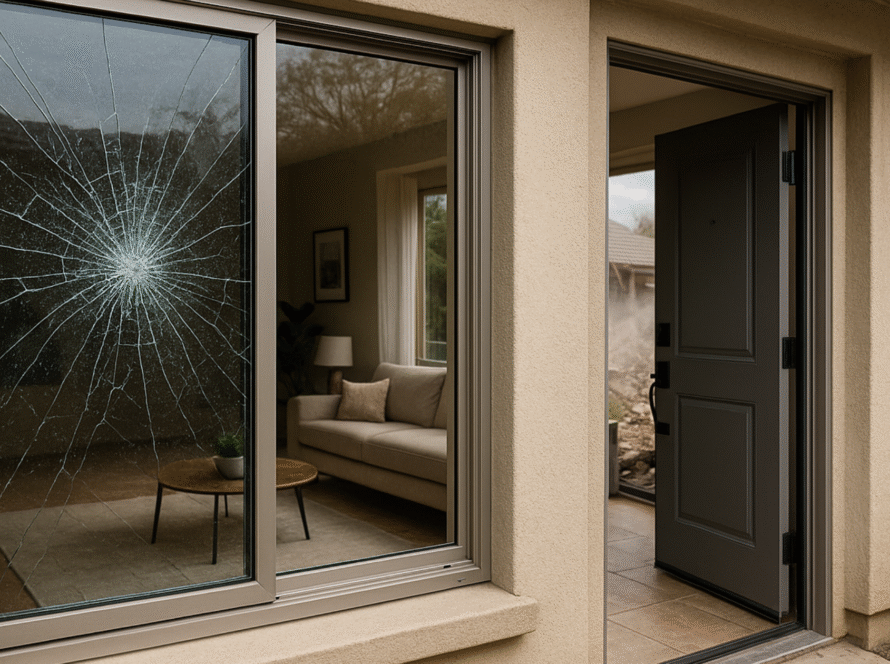
Understanding what happens if you replace windows without a permit helps Bay Area homeowners avoid costly fines, legal problems, and insurance complications during home improvement projects.
The Real Cost of Skipping Permits
What happens if you replace windows without a permit, and why do California building departments care about window replacement projects? Unpermitted window work can result in significant fines, mandatory removal of new windows, voided homeowner’s insurance coverage, home sale complications, and legal action from local municipalities.
Many Bay Area homeowners don’t realize that window installation typically requires a building permit. The assumption that like-for-like window replacements don’t require permits is partially true, but California’s Title 24 energy requirements and local building codes create situations where permits are required even for simple replacements.
Understanding permit requirements for window replacement protects you from expensive consequences. Benicia, San Francisco, and other Bay Area jurisdictions enforce building codes strictly. Working without required permits creates problems that far exceed the modest cost and time investment of obtaining a permit properly.
Why Permits Matter for Window Projects
Building permits serve specific purposes beyond generating revenue for cities. The permit ensures your window replacement project meets current building codes for safety, energy efficiency, emergency egress, light and ventilation, and structural integrity.
California’s Title 24 energy standards require specific U-factors and Solar Heat Gain Coefficients for replacement windows. Without permits and inspections, there’s no way to verify that new windows meet these energy-efficient requirements. This matters both for home performance and legal compliance.
Financial Consequences
Fines and Penalties
Local building departments issue fines when they discover unpermitted work. In Bay Area jurisdictions, initial fines typically start at $500 to $1,000 per violation. Some cities calculate penalties based on project value, potentially reaching several thousand dollars for whole-house window replacement projects.
Fines increase with time. What begins as a modest penalty can escalate if homeowners don’t immediately obtain permits for completed work. Some jurisdictions charge daily fines until violations are corrected, creating mounting financial obligations.
Contractors face even steeper consequences. Licensed contractors who perform unpermitted work risk suspension or revocation of their license. This enforcement mechanism encourages reputable window installation contractors to handle permits properly as part of their service.
Retroactive Permit Costs
Obtaining permits after completing work costs significantly more than getting them before starting. Many Bay Area building departments charge double or triple the normal permit fee for retroactive permits. These “after-the-fact” permits also require more extensive documentation and potentially invasive inspections.
The existing window work may not meet current code requirements. When discovered during retroactive permitting, these deficiencies require corrections at your expense. You might need to:
Remove and reinstall windows to meet egress requirements. Add safety glazing in hazardous locations. Upgrade to windows meeting current energy standards. Correct improper flashing or weatherproofing. Repair interior or exterior finishes to meet code.
These corrections easily cost more than the original window replacement project, turning an attempt to save money into a financial disaster.
Mandatory Removal Requirements
The worst financial outcome involves the mandatory removal of unpermitted windows. Building departments have the authority to issue “cease and desist” orders requiring you to remove new windows and restore openings to their previous condition.
This creates a triple cost: paying for the initial window installation, paying for removal and restoration, and eventually paying for proper permitted installation. For a typical Bay Area window replacement project costing $10,000 to $20,000, these combined expenses can exceed $30,000.
Planning a window upgrade? Work with licensed window replacement contractors who handle permits properly and ensure your project meets all California building codes from the start.
Insurance and Liability Issues
Voided Coverage
Homeowner’s insurance policies contain clauses about unpermitted work. When claims relate to unpermitted windows or damage resulting from improper installation, insurance companies can deny coverage entirely.
Consider a scenario in which new, unpermitted windows fail during a Bay Area storm. Water infiltration damages walls, flooring, and furnishings. Your insurance company investigates, discovers the unpermitted window installation, and denies the claim. You’re responsible for all repair costs.
The insurance issue extends beyond window-specific claims. Some insurers void entire policies when they discover significant unpermitted work. This leaves homeowners completely unprotected until they correct violations and restore coverage.
Liability for Injuries
Building codes exist largely to protect safety. Windows must meet egress requirements to allow occupants to escape during a fire. They need proper glass types in hazardous locations to prevent injuries. Adequate lighting and ventilation are essential for maintaining healthy indoor environments.
Unpermitted windows that don’t meet these safety standards create liability. If someone is injured due to code violations—trapped in a bedroom fire because windows don’t meet egress requirements, or cut by non-tempered glass in a required safety glazing location—property owners face significant legal exposure.
The argument “I didn’t know permits were required” provides no legal protection. Property owners remain liable for code compliance regardless of whether they personally did the work or hired contractors.
Home Sale Complications
Disclosure Requirements
California law requires sellers to disclose known material defects. Unpermitted work qualifies as a material defect. Failing to disclose unpermitted windows constitutes fraud, creating legal liability that extends beyond the sale closing.
Most sellers discover their unpermitted window work during the sale process. Title companies, home inspectors, and buyer’s agents often spot missing permits. This discovery derails transactions and requires resolution before sales can proceed.
Buyer Negotiations
When unpermitted work surfaces during home sales, buyers gain significant negotiating leverage. They typically demand one of these resolutions:
Seller Obtains Permits: You pay for retroactive permits and any required corrections, and you may allow reinspection of completed work. This delays closing and costs thousands of dollars.
Price Reduction: Buyers demand price reductions covering permit costs, potential code corrections, and a buffer for unknown issues. These reductions often exceed actual costs due to uncertainty.
Seller Credits: You provide cash at closing for buyers to handle their own permitting, typically in amounts exceeding the actual permit costs.
Sale Cancellation: Some buyers simply walk away when unpermitted work appears, especially if financing requires code compliance.
Each outcome costs you money and creates stress during an already complicated process.
Financing Problems
Mortgage lenders often require confirmation that major improvements have proper permits. Banks protecting their collateral interest don’t want to finance properties with code violations that could result in correction orders.
When appraisers or lenders discover unpermitted windows, they may:
Refuse financing until permits are obtained. Reduce appraised value to account for unpermitted work. Require correction before closing. Demand additional title insurance.
These financing complications kill deals or force sellers to accept reduced proceeds to compensate for buyer financing challenges.
When Permits Are Required
California Title 24 Requirements
Most window replacement projects in California require permits because of Title 24 energy standards. When replacing more than one window or windows totaling more than 75 square feet, building permits are required to verify energy compliance.
New windows must meet minimum performance standards: U-factor of 0.30 or better and Solar Heat Gain Coefficient of 0.23 or better for most Bay Area climate zones. The permit process confirms these requirements through product documentation.
Structural and Size Changes
Any project involving structural modifications requires permits without exception. This includes:
Changing window opening sizes. Adding new windows. Converting window types. Modifying framing or headers. Altering exterior finishes.
Even minor projects may require permits if they affect the building’s structure or envelope.
Egress and Safety Requirements
Bedroom windows must meet emergency egress requirements. Specific minimum sizes and maximum sill heights ensure occupants can escape during emergencies. Permits verify egress compliance through plan review and inspection.
Safety glazing requirements for windows near floors, doors, and stairs also trigger permit needs. Building codes specify where tempered glass is mandatory. Permits ensure proper glass types are installed in required locations.
Like-for-Like Replacement Exceptions
True like-for-like replacements—identical size, type, and location—sometimes avoid permit requirements in certain jurisdictions. However, even these replacements typically need permits in California due to Title 24 energy standards.
Bay Area homeowners shouldn’t assume any window replacement project avoids permits. Check with your local building department about specific project requirements before starting work.
Stop-Work Orders and Delays
Building inspectors who discover unpermitted work issues issue stop-work orders. These legal commands halt all construction immediately. Continuing work after receiving a stop-work order increases fines and legal consequences.
Stop-work orders significantly delay window replacement projects. You must:
Apply for permits. Wait for permit review and approval. Schedule inspections of completed work. Make any required corrections. Obtain approval before resuming work.
This process takes weeks or months, leaving your home with incomplete window installations. The security, weather protection, and energy efficiency issues created by delayed projects often exceed permit costs many times over.
How to Avoid Problems
Check Requirements Early
Contact your local building department before starting any window replacement project. Benicia’s Building Division, San Francisco’s Department of Building Inspection, and other Bay Area jurisdictions provide guidance about when permits are needed for your specific project.
This preliminary research takes minimal time and provides certainty about requirements. Even if you’re confident, permits aren’t needed; confirming with authorities protects you from incorrect assumptions.
Hire Licensed Professionals
Reputable window installation contractors know local permit requirements and handle the permitting process as part of their service. They understand which projects need permits, how to obtain them, and what building codes apply.
Licensed contractors carry insurance that protects homeowners from installation errors. This protection disappears when you work without permits, leaving you financially exposed to any issues.
Budget for Permits
Window replacement permits in Bay Area jurisdictions typically cost $200 to $500, depending on project scope. This represents a tiny fraction of overall project costs. The modest investment provides legal protection, insurance coverage, and peace of mind.
Factor permit costs into project budgets from the beginning. Attempting to save a few hundred dollars by skipping permits risks thousands in fines, corrections, and legal consequences.
Document Everything
Keep all permits, inspection records, and product documentation. These records prove code compliance for insurance claims, home sales, and any future questions about work quality.
Proper documentation adds value during home sales by demonstrating that the professional installation meets all requirements. It also speeds up any warranty claims or future repairs.
Protecting Your Investment
What happens if you replace windows without a permit depends on whether violations are discovered and how your local jurisdiction enforces building codes. However, the potential consequences—fines, mandatory removal, insurance problems, and home sale complications—far exceed permit costs.
Bay Area building departments actively enforce permit requirements. Neighbors report unpermitted work, home sales reveal violations, and insurance claims trigger investigations. The risk of discovery remains substantial throughout your ownership.
Working within the permit system protects your home improvement investment. Building permits aren’t bureaucratic obstacles but rather verification that your windows meet safety standards, energy requirements, and building codes designed to protect occupants and property values.
When planning window replacement in Benicia or anywhere in the Bay Area, start by determining permit requirements for your specific project. Work with licensed contractors who handle permits properly. The small additional time and cost pays dividends through legal compliance, proper installation, maintained insurance coverage, and smooth home sales when the time comes.
Don’t let permit avoidance turn a smart home improvement into an expensive legal problem. Get proper permits, ensure code compliance, and enjoy new windows without the worry that unpermitted work creates.
Since 1987, Insight Glass has provided top-quality windows & patio doors in the Bay Area.
Call 707-746-6571 for Expert Installation!
CONTACT US TO GET A FREE ESTIMATE!


